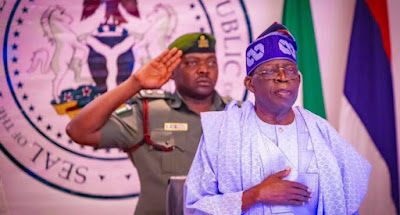Following the controversy emanating from the Tax Reforms
Bills, President Bola Tinubu has directed the Ministry of Justice to work
closely with the National Assembly to address the concerns within and outside
the legislature.
The Minister of Information and National Orientation,
Mohammed Idris, revealed this in a statement he signed Tuesday titled
‘President Tinubu committed to accountability on tax bills, directs Ministry of
Justice to work with NASS on concerns.’
Mohammed said, “In line with the established legislative
procedure, the Federal Government welcomes meaningful inputs that can address
whatever grey areas there may be in the bill.
“In this vein, President Tinubu has already directed the
Federal Ministry of Justice and relevant officials who worked on the drafts to
work closely with the National Assembly to ensure that all genuine concerns
have been addressed before the bills are passed.”
Following approval of the Federal Executive Council in
October, President Tinubu transmitted four tax reform bills to the National
Assembly for consideration.
The Federal Government says the bills are aimed at
overhauling the nation’s tax system.
They include the Nigeria Tax Bill 2024, the Nigeria Tax
Administration Bill, the Nigeria Revenue Service (Establishment) Bill, and the
Joint Revenue Board (Establishment) Bill.
The proposed legislation seeks to consolidate existing tax
laws, establish clearer frameworks for tax administration, and create bodies
like the Tax Appeal Tribunal and the Office of the Tax Ombudsman.
However, they have sparked significant controversy.
Critics argue that the reforms could disrupt the balance of
fiscal federalism, potentially centralising tax authority and diminishing state
revenues.
Notably, at a meeting on October 28, 2024, governors of the
19 Northern States, under the platform of the Northern Governors’ Forum,
rejected the new derivation-based model for Value-Added Tax distribution in the
tax reform bills.
They argued that the changes might adversely affect their
regions’ financial autonomy.
Three days later, the National Economic Council comprising
all 36 state governors asked the President to withdraw the Tax Reforms Bill
from the National Assembly for more comprehensive consultations.
However, the President said there would be no need to
withdraw the tax reforms bill from the National Assembly.
He insisted that, while the legislative process takes its
course, inputs and changes can be made without withdrawing the bill from the NASS.
The controversy has permeated the legislative process. Some
senators such as the dormer Senate Chief Whip, Ali Ndume, are calling for the
withdrawal of the bills to allow for more extensive consultations.
Governor Babagana Zulum of Borno State has also warned that
while President Tinubu can deploy his executive powers to pass the tax reform
bills, there would be consequences for millions of Nigerians.
Zulum added that the proposed VAT-sharing model will only
benefit Lagos and Rivers states.
Nonetheless, the Senate proceeded to pass the bills for a
second reading, a move that has been met with harsh criticism.
In its statement on Monday, the Presidency said most
reactions from political leaders and commentators “are not grounded in facts,
reality, or sufficient knowledge of the bills.”
It said the tax bills will not enrich Lagos or Rivers states
at the expense of northern states.
Corroborating the Presidency’s stance, the Information
Minister said, “The fiscal reforms will not impoverish any State or region of
the country, neither will they lead to the scrapping or weakening of any
federal agencies.”
“Similarly, it is important to be aware that there is a lot
of misinformation and fake news circulating around the tax bills and the
overall reform agenda of the Tinubu Administration.
“I call on all commentators and groups to keep up the spirit
of informed engagement, and to strive to be respectful and understanding at all
times despite the diversity of opinions. In the spirit of democratic
engagement, there should be no room for name-calling, or for the injection of
unnecessary ethnic and regional slurs into this important national
conversation,” Idris added.
The FG welcomed the nationwide debate on the bills saying
“This is the very essence and meaning of democracy.”
It argued that contrary to the popular notions the bills
will “bring relief to tens of millions of hardworking Nigerians across the
country and empower and position our States and the 774 Local Governments for
sustainable growth and development.”
It said the President’s ambitious fiscal reform agenda will
devolve more resources to Nigeria’s State and Local Governments, and ultimately
to the Nigerian people, in the spirit of harnessing democracy that works for
the people.
Idris argued that Nigerians are witnessing the most far-reaching,
impactful, and beneficial set of fiscal reforms that Nigeria has seen in
decades.
In addition to the four tax bills being debated and
deliberated upon, there is also the 2023 Supreme Court ruling on financial
autonomy for local governments, which will significantly empower the tier of
government that is closest to the Nigerian people.
The FG said these reforms will not only facilitate increased
revenues (without imposing additional tax burdens on the people), they will
also make it possible for citizens to demand and enjoy greater accountability
in the management of public resources at all levels of government.
“President Tinubu and the administration will continue to
champion policies that close the loopholes and gaps through which Nigeria’s
valuable public resources have been frittered away for decades.
On top of this necessary foundation, the resources being
conserved and realised from these reforms will be invested in critical
infrastructure (healthcare, education, transportation, digital technology, etc)
and in social investments that will benefit all Nigerians and ensure that no one
is left behind.
“This is the promise and the reality of the Renewed Hope
agenda,” the statement read.
Click to signup for FREE news updates, latest information and hottest gists everyday
Advertise on Areatatafo.com.ng to reach thousands of our daily users









